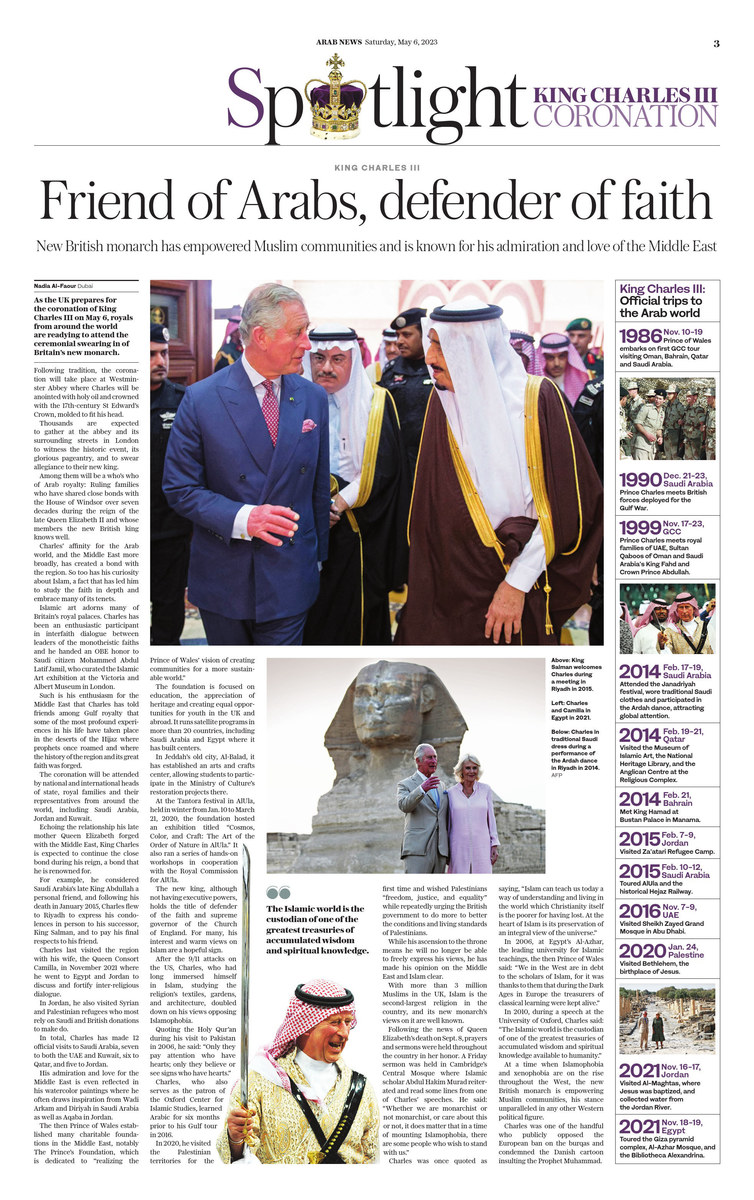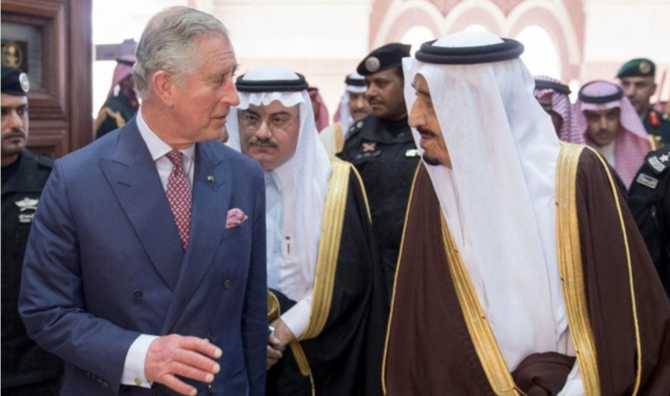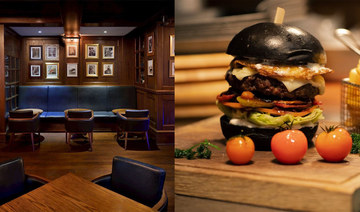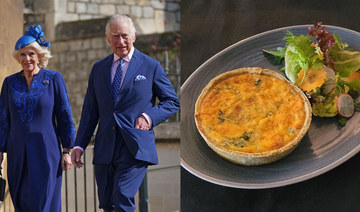DUBAI: As the UK prepares for the coronation of King Charles III on May 6, royals from around the world are readying to attend the ceremonial swearing in of Britain’s new monarch.
Following tradition, the coronation will take place at Westminster Abbey where Charles will be anointed with holy oil and crowned with the 17th century St Edward’s Crown, molded to fit his head.
Thousands are expected to gather at the abbey and its surrounding streets in London to witness the historic event, its glorious pageantry, and to swear allegiance to their new king.
Among them will be a who’s who of Arab royalty; ruling families who have shared close bonds with the House of Windsor over seven decades during the reign of the late Queen Elizabeth II and whose members the new British king knows well.
Charles’ affinity for the Arab world, and the Middle East more broadly, has created a bond with the region. So too has his curiousness for Islam, a fact that has led him to study the faith in depth and embrace many of its tenets.
Islamic art adorns many of Britain’s royal palaces. Charles has been an enthusiastic participant in interfaith dialogue between leaders of the monotheistic faiths and he handed an OBE honor to Saudi citizen Mohammed Abdul Latif Jamil, who curated the Islamic Art exhibition at the Victoria and Albert Museum in London.
Such is his enthusiasm for the Middle East, that Charles has told friends among Gulf royalty that some of his most profound experiences in life have been spent in the deserts of the Hijaz where prophets once roamed and where the history of the region and its great faith was forged.
The coronation will be attended by national an d international heads of state, royal families, and their representatives from around the world including Saudi Arabia, Jordan, and Kuwait.
Echoing the relationship his late mother Queen Elizabeth forged with the Middle East, King Charles is expected to continue the close bond during his reign, one he is renowned for.
For example, he considered Saudi Arabia’s late King Abdullah a personal friend, and following his death in January 2015, Charles flew to Riyadh to express his condolences in person to his successor, King Salman, and to pay his final respects to his friend.
Charles last visited the region with his wife, the Queen Consort Camilla, in November 2021 where he went to Egypt and Jordan to discuss and fortify inter-religious dialogue.
In Jordan, he also visited Syrian and Palestinian refugees who most rely on Saudi and British donations to make do.
In total, Charles has made 12 official visits to Saudi Arabia, seven to both the UAE and Kuwait, six to Qatar, and five to Jordan.
His admiration and love for the Middle East is even reflected in his watercolor paintings where he often draws inspiration from Wadi Arkam and Diriyah in Saudi Arabia as well as Aqaba in Jordan.
The then Prince of Wales, established many charitable foundations in the Middle East, notably The Prince’s Foundation, which is dedicated to “realizing the Prince of Wales’ vision of creating communities for a more sustainable world.”
The foundation is focused on education, the appreciation of heritage, and creating equal opportunities for youth in the UK and abroad. It runs satellite programs in more than 20 countries, including Saudi Arabia and Egypt where it has built centers.
In Jeddah’s old city, Al-Balad, it has established an arts and crafts center, allowing students to participate in the Ministry of Culture’s restoration projects there.
At the Tantora festival in AlUla held in winter from Jan. 10 to March 21, 2020, the foundation portrayed an exhibition titled “Cosmos, Color, and Craft: The Art of the Order of Nature in AlUla.” It also ran a series of hands-on workshops in cooperation with the Royal Commission for AlUla.
The new king, although not having executive powers, holds the title of defender of the faith and supreme governor of the Church of England. For many, his interest and warm views on Islam are a hopeful sign.
After the 9/11 attacks on the US, Charles, who long immersed himself in Islam, studying the religion’s textiles, gardens, and architecture, doubled down on his views opposing Islamophobia.
Quoting the Holy Qur’an during his visit to Pakistan in 2006, he said: “Only they pay attention who have hearts; only they believe or see signs who have hearts.”
Charles, who also serves as the patron of the Oxford Center for Islamic Studies, learned Arabic for six months prior to his Gulf tour in 2016.
In 2020, he visited the Palestinian territories for the first time and wished Palestinians “freedom, justice, and equality” while repeatedly urging the British government to do more to better the conditions and living standards of Palestinians.
While his ascension to the throne means he will no longer be able to freely express his views, he has made his opinion on the Middle East and Islam clear.
With more than 3 million Muslims in the UK, Islam is the second-largest religion in the country, and its new monarch’s views on it are well known.
Following the news of Queen Elizabeth’s death on Sept. 8, prayers and sermons were held throughout the country in her honor. A Friday sermon was held in Cambridge’s Central Mosque where Islamic scholar Abdul Hakim Murad reiterated and read some lines from one of Charles’ speeches. He said: “Whether we are monarchist or not monarchist, or care about this or not, it does matter that in a time of mounting Islamophobia, there are some people who wish to stand with us.”
Charles was once quoted as saying, “Islam can teach us today a way of understanding and living in the world which Christianity itself is the poorer for having lost. At the heart of Islam is its preservation of an integral view of the universe.”
In 2006, at Egypt’s Al-Azhar, the leading university for Islamic teachings, the then Prince of Wales said: “We in the West are in debt to the scholars of Islam, for it was thanks to them that during the Dark Ages in Europe the treasurers of classical learning were kept alive.”
In 2010, during a speech at the University of Oxford, Charles said: “The Islamic world is the custodian of one of the greatest treasuries of accumulated wisdom and spiritual knowledge available to humanity.”
At a time when Islamophobia and xenophobia are on the rise throughout the West, the new British monarch is empowering Muslim communities, his stance unparalleled in any other Western political figure.
Charles was one of the handful who publicly opposed the European ban on the burqas and condemned the Danish cartoon insulting the Prophet Muhammad.
King Charles III: Official trips to the Arab world
-
1
Prince of Wales embarks on first GCC tour visiting Oman, Bahrain, Qatar and Saudi Arabia
-
2
Saudi Arabia: Prince Charles meets with British forces deployed for the Gulf War

-
3
GCC: Prince Charles meets with royal families of UAE, Sultan Qaboos of Oman and Saudi Arabia’s King Fahad and Crown Prince Abdullah.

-
4
Saudi Arabia: Visited with Camilla, Duchess of Cornwall, and received a white Arabian stallion and a pair of swords as a gift.

-
5
Kuwait: Participated in the celebrations for the 50th anniversary of Kuwait’s independence.

-
6
Saudi Arabia: Attended the Janadriyah festival, wore traditional Saudi clothes and participated in the Ardah dance, attracting global attention

-
7
Qatar: Visited the Museum of Islamic Art, the National Heritage Library, and the Anglican Centre at the Religious Complex
-
8
UAE: Met with Sheikh Mohammad bin Zayed Al-Nahyan, then-Crown Prince of Abu Dhabi
-
9
Bahrain: Met with King Hamad at Bustan Palace in Manama
-
10
Jordan: Visited Za’atari Refugee Camp
-
11
Saudi Arabia: Toured AlUla and the historical Hejaz Railway

-
12
UAE: Visited Sheikh Zayed Grand Mosque in Abu Dhabi

-
13
Palestine: Visited Bethlehem, the birthplace of Jesus
-
14
Jordan: Visited Al-Maghtas, where Jesus was baptized, and collected water from the Jordan River

-
15
Egypt: Toured the Giza pyramid complex, Al-Azhar Mosque, and the Bibliotheca Alexandria

-
16
Prince Charles visits the National Library in Doha, Qatar

-
17
Saudi Arabia: King Salman welcomed Prince Charles on a two-day private visit to the Kingdom

















